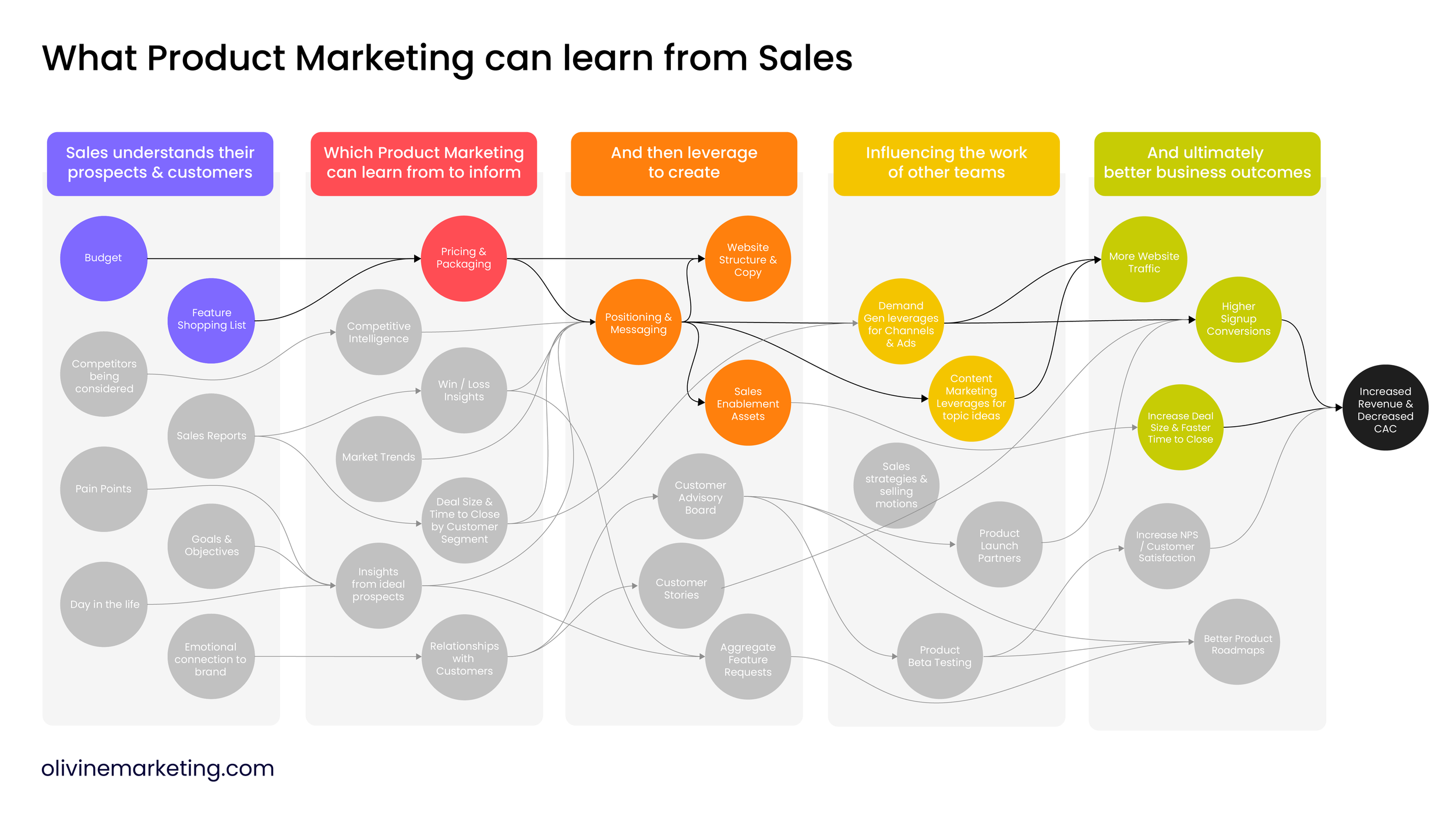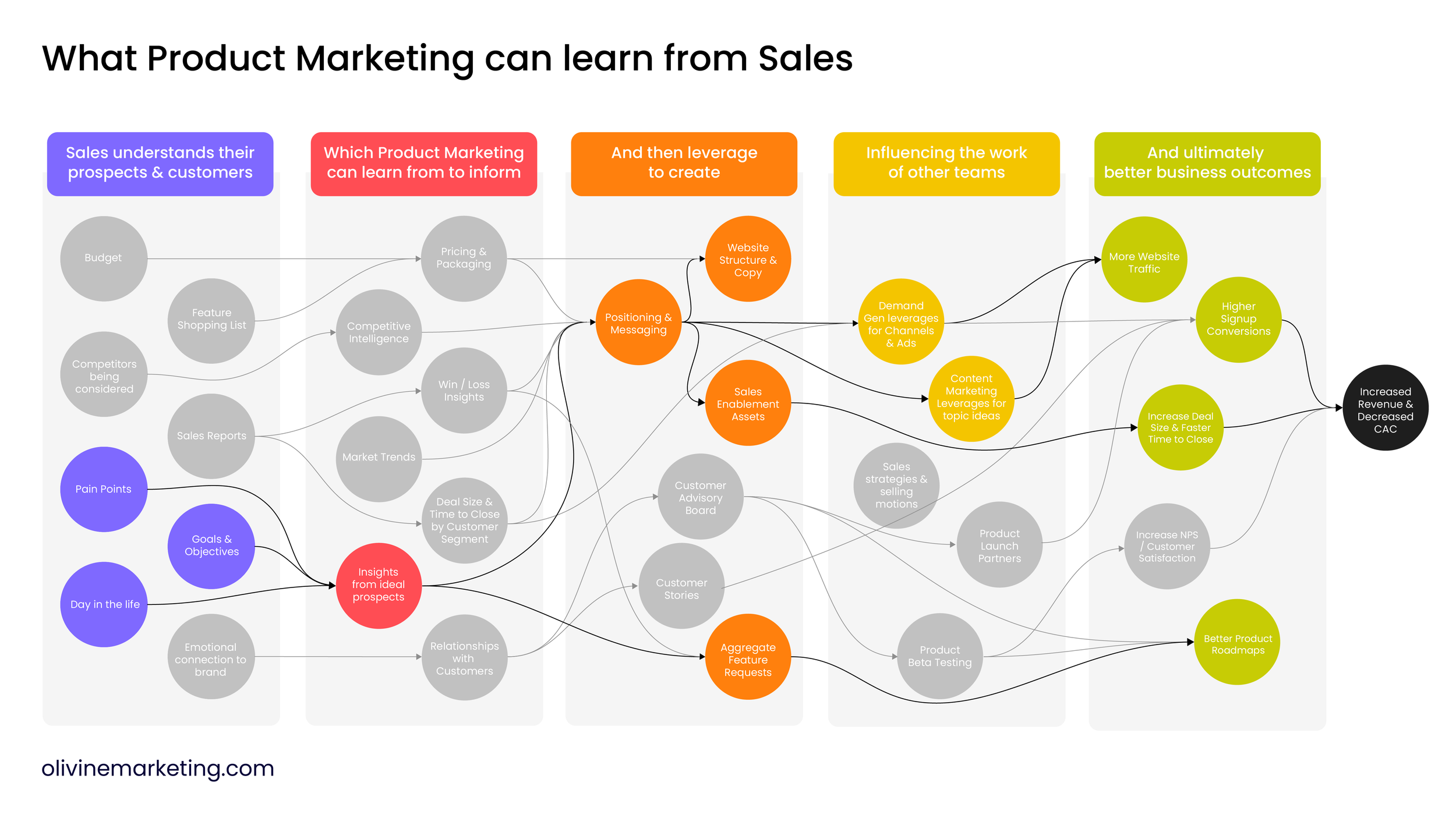What product marketers can learn from salespeople
ARTWORK BY Filipa Paiva
In B2B companies, Product Marketing and Sales should be in lockstep. But too often sales and marketing are at odds, or insights only flow one way. The more product marketers can learn from sales, the better they can collaborate and impact revenue.
As an intern for a management consulting firm, I toiled away in a gray polyester-lined cubicle. Silicon Valley’s buzz promised a more exciting path. So, I joined Oracle’s Business Development Consultant program and dove into the world of sales. I prospected emerging startups, uncovered sales opportunities, and did account strategy. I refined my messaging with customers and came up with creative solutions to their problems. Once I discovered that Product Marketing encompassed all of this (plus more), I pivoted.
Ideally, product marketing sits at the intersection of product, marketing, and sales. The beauty of a career in Product Marketing is that you can stay broad or focus more on sales, research, product, etc. Since PMMs work with many different teams, we can absorb the best attributes from our colleagues and add them to our skillset. What I learned in Sales fundamentally informed and impacted my approach as a Product Marketer. Here’s what I’ve carried with me from my former life.
Be your customer’s best champion
Orienting your goals around solving customers’ challenges is foundational to being a great PMM. Salespeople talk to customers all day and intimately know what their day-to-day looks like, what their boss cares about, and what metrics they’re being held against. They champion those needs and rally teams to structure favorable terms to get deals over the finish line, whether it’s advocating for discounts, flexible payment schedules, or fast and painless implementation services.
While Sales has deep account-level knowledge of their customers’ needs, Product Marketers collect and organize customer insights at an aggregate level. You can develop key insights about customers’ business objectives, challenges, use cases, and pain points by interviewing Salespeople, meeting with customers directly, or deploying surveys. Then channel this work by sharing broadly with your cross-functional partners, such as Product Management when it comes to informing the product roadmap, guiding the content strategy for events, or structuring key messages for an upcoming Demand Generation campaign.
Often times product marketing (and product management) folks are resistant to sitting in on sales calls because they aren’t clear about exactly what they will get out of it. There’s no formula that says “if you go to X sales calls you will learn Y”, but over time product marketing can learn invaluable insights that will impact strategy through the entire funnel.
Budget conversations can influence pricing, which impacts positioning and messaging. Understanding competitors being considered and win/loss reports influences sales enablement assets, and so on.
Ground your messaging in real-world language and situations
“In Sales, I learned to cut the marketing fluff and get to the point of what I was selling, or else I’d get hung up on.”
In Sales, I learned to cut the marketing fluff and get to the point of what I was selling, or else I’d get hung up on. Messaging is a core product marketing skill that can take many forms but requires the appropriate avenues to be effective. For example, visionary storytelling has a place in conference keynotes, not cold calls. When equipping Sales with assets like pitch decks and talk tracks, make sure it’s relevant to how and where these conversations are happening.
People are not sitting through hour-long pitch presentations and demos.
How can you make it more of a conversation?
What language is the customer using to describe their challenges?
How do they talk about your product?
Listening to Gong calls, reviewing win/loss reports, and sifting through written customer feedback can help you understand what’s happening on the frontlines. Before rolling out new messaging, I always battletest it with Sales or customers to ensure it’s grounded in what customers are actually saying.
“Visionary storytelling has a place in conference keynotes, not cold calls.”
Ruthlessly prioritize by asking yourself “Is this a revenue-generating activity?”
While learning the ropes at Oracle, my first Sales Manager would ask “Is this a revenue-generating activity?” as a way to stay laser-focused on activities that would lead me to hit quota. Product Marketers can be pulled into many different directions but our ultimate goal is to drive pipeline and revenue for the business. We do that by driving product adoption, building awareness, and accelerating sales. When I’m planning my quarterly priorities or evaluating whether a random request is worth pursuing, I come back to this question to help decide where I should spend my time.
Get our monthly product marketing newsletter: SUBSCRIBE
Show value to be an effective business partner
While the end goal in Sales is to convert a prospect into a customer, enterprise sales cycles can take six to nine months and even two years. That’s why it’s fundamental to build relationships with different contacts in the prospect’s organization from the buyer to the user. At Oracle, we built relationships with customers by showing value, sharing (actually useful) insights, and asking well thought-out questions.
We won customers by building relationships versus focusing on features and pricing. As Product Marketers, we often have to influence other teams to take action without authority over those teams. Relationships built on trust make you an effective cross-functional collaborator. For example, show value to Product Management by sharing the latest product launch from a competitor or trends you’re hearing from customer conversations to help guide product use cases and differentiators. Help others in the organization move toward a common goal that drives business impact, not just what you want to get out of the relationship.
I’m a better product marketer because of my sales experience, from working on the frontlines with customers to carrying quotas. At Olivine, our team of Product Marketers come from all walks of life, including finance, sales, and journalism. The ones from sales can enable your Sales team to become even more effective.









